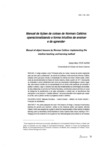Manual de liçôes de coisas de Norman Calkins: operacionalizando a forma intuitiva de ensinar e de aprender

View/
Use this link to cite
http://hdl.handle.net/2183/7825Collections
Metadata
Show full item recordTitle
Manual de liçôes de coisas de Norman Calkins: operacionalizando a forma intuitiva de ensinar e de aprenderAuthor(s)
Date
2007Citation
Sarmiento Anuario galego de historia da educación, 2007, 11: 79-92. ISSN: 1138-5863
Abstract
[Abstract] The article analyzes the work “First lessons of things: a manual of elementary
teaching for parents and teachers”, written by the American author and teacher, Norman
Calkins, which was adopted as a guide to direct the implementation of the method of intuitive
teaching used by elementary school teachers in Santa Catarina State, Brazil, starting in 1911.
Ranging from the contents to be supplied to the methodological prescriptions to be followed,
this manual is very particular representation of the way in which teaching is conceived and
practiced, making it one of the fundamental links in the creation of the identity of schooltea-
chers during the period of the First Republic. This manual served to instill the core categories
of thought and action that were essential to the mission they were charged with by the
Republicans, i.e. to produce “rational citizens” which, at that time, was interpreted as being a
law-abiding, patriotic citizens who believed in social and scientific progress.
Keywords
Manuais escolares
Cultura escolar
Método de ensino intuitivo
Produçâo de identidades
School manuals
School culture
Method of intuitive teaching
Production of identities
Cultura escolar
Método de ensino intuitivo
Produçâo de identidades
School manuals
School culture
Method of intuitive teaching
Production of identities
ISSN
1138-5863





